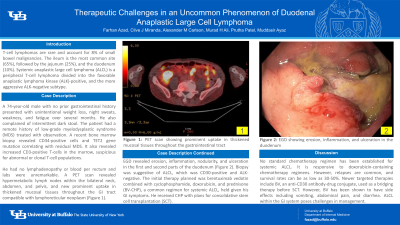Monday Poster Session
Category: Small Intestine
P2679 - Therapeutic Challenges in an Uncommon Phenomenon of Duodenal Anaplastic Large Cell Lymphoma
Monday, October 23, 2023
10:30 AM - 4:15 PM PT
Location: Exhibit Hall

Has Audio

Farhan Azad, DO
University at Buffalo
Buffalo, New York
Presenting Author(s)
Farhan Azad, DO, Clive J. Miranda, DO, MS, Alexander M. Carlson, DO, Murad H. Ali, MD, Prutha Patel, DO, Muddasir Ayaz, MD
University at Buffalo, Buffalo, NY
Introduction: T-cell lymphomas are rare and account for 8% of small bowel malignancies. The ileum is the most common site (65%), followed by the jejunum (25%), and the duodenum (10%). Systemic anaplastic large cell lymphoma (ALCL) is a peripheral T-cell lymphoma divided into the favorable anaplastic lymphoma kinase (ALK)-positive, and the more aggressive ALK-negative subtype.
Case Description/Methods: A 74-year-old male with no prior gastrointestinal (GI) history presented with unintentional weight loss of around 30-40 pounds, night sweats, weakness, and fatigue over several months. In addition, he complained of new episodes of intermittent dark stool. He had a remote history of low-grade myelodysplastic syndrome (MDS) treated with observation. A recent bone marrow biopsy revealed CD34-positive cells and ten-eleven-translocation-2 (TET2) gene mutation correlating with residual MDS. It also revealed increased CD3-positive T-cells in the marrow, suspicious for abnormal or clonal T-cell populations. He was hemodynamically stable with no palpable lymphadenopathy or blood per rectum on exam. Laboratory values revealed hemoglobin at a baseline of 10.2 g/dL, normal WBC, and normal platelets. PET scan revealed hypermetabolic lymph nodes within the bilateral neck, abdomen, and pelvis, and new prominent uptake in thickened mucosal tissues throughout the GI tract compatible with lymphoreticular neoplasm (Figure 1). A subsequent EGD revealed erosion, inflammation, nodularity, and ulceration in the first and second parts of the duodenum (Figure 2). Biopsy was suggestive of ALCL, which was CD30-positive and ALK-negative. The initial therapy planned was brentuximab vedotin combined with cyclophosphamide, doxorubicin, and prednisone (BV-CHP), a common regimen for systemic ALCL. However, given his GI symptoms, BV was held. He received CHP with plans for consolidation with autologous stem cell transplantation (ASCT).
Discussion: Due to its rarity, no standard chemotherapy regimen has been established for systemic ALCL. It is generally responsive to doxorubicin-containing chemotherapy regimens. However, relapses are common, and 5-year survival rates can still be as low as 30-50% despite therapy. Newer targeted therapies include BV, an anti-CD30 antibody-drug conjugate, used as a bridging therapy before ASCT. However, BV has been shown to have side effects including vomiting, abdominal pain, and diarrhea. ALCL within the GI system poses therapeutic challenges and patients require close monitoring.

Disclosures:
Farhan Azad, DO, Clive J. Miranda, DO, MS, Alexander M. Carlson, DO, Murad H. Ali, MD, Prutha Patel, DO, Muddasir Ayaz, MD. P2679 - Therapeutic Challenges in an Uncommon Phenomenon of Duodenal Anaplastic Large Cell Lymphoma, ACG 2023 Annual Scientific Meeting Abstracts. Vancouver, BC, Canada: American College of Gastroenterology.
University at Buffalo, Buffalo, NY
Introduction: T-cell lymphomas are rare and account for 8% of small bowel malignancies. The ileum is the most common site (65%), followed by the jejunum (25%), and the duodenum (10%). Systemic anaplastic large cell lymphoma (ALCL) is a peripheral T-cell lymphoma divided into the favorable anaplastic lymphoma kinase (ALK)-positive, and the more aggressive ALK-negative subtype.
Case Description/Methods: A 74-year-old male with no prior gastrointestinal (GI) history presented with unintentional weight loss of around 30-40 pounds, night sweats, weakness, and fatigue over several months. In addition, he complained of new episodes of intermittent dark stool. He had a remote history of low-grade myelodysplastic syndrome (MDS) treated with observation. A recent bone marrow biopsy revealed CD34-positive cells and ten-eleven-translocation-2 (TET2) gene mutation correlating with residual MDS. It also revealed increased CD3-positive T-cells in the marrow, suspicious for abnormal or clonal T-cell populations. He was hemodynamically stable with no palpable lymphadenopathy or blood per rectum on exam. Laboratory values revealed hemoglobin at a baseline of 10.2 g/dL, normal WBC, and normal platelets. PET scan revealed hypermetabolic lymph nodes within the bilateral neck, abdomen, and pelvis, and new prominent uptake in thickened mucosal tissues throughout the GI tract compatible with lymphoreticular neoplasm (Figure 1). A subsequent EGD revealed erosion, inflammation, nodularity, and ulceration in the first and second parts of the duodenum (Figure 2). Biopsy was suggestive of ALCL, which was CD30-positive and ALK-negative. The initial therapy planned was brentuximab vedotin combined with cyclophosphamide, doxorubicin, and prednisone (BV-CHP), a common regimen for systemic ALCL. However, given his GI symptoms, BV was held. He received CHP with plans for consolidation with autologous stem cell transplantation (ASCT).
Discussion: Due to its rarity, no standard chemotherapy regimen has been established for systemic ALCL. It is generally responsive to doxorubicin-containing chemotherapy regimens. However, relapses are common, and 5-year survival rates can still be as low as 30-50% despite therapy. Newer targeted therapies include BV, an anti-CD30 antibody-drug conjugate, used as a bridging therapy before ASCT. However, BV has been shown to have side effects including vomiting, abdominal pain, and diarrhea. ALCL within the GI system poses therapeutic challenges and patients require close monitoring.

Figure: Figure 1: PET scan showing prominent uptake in thickened mucosal tissues throughout the gastrointestinal tract compatible with lymphoreticular neoplasm
Figure 2: EGD showing erosion, inflammation, and ulceration in the duodenum (arrow)
Figure 2: EGD showing erosion, inflammation, and ulceration in the duodenum (arrow)
Disclosures:
Farhan Azad indicated no relevant financial relationships.
Clive Miranda indicated no relevant financial relationships.
Alexander Carlson indicated no relevant financial relationships.
Murad Ali indicated no relevant financial relationships.
Prutha Patel indicated no relevant financial relationships.
Muddasir Ayaz indicated no relevant financial relationships.
Farhan Azad, DO, Clive J. Miranda, DO, MS, Alexander M. Carlson, DO, Murad H. Ali, MD, Prutha Patel, DO, Muddasir Ayaz, MD. P2679 - Therapeutic Challenges in an Uncommon Phenomenon of Duodenal Anaplastic Large Cell Lymphoma, ACG 2023 Annual Scientific Meeting Abstracts. Vancouver, BC, Canada: American College of Gastroenterology.
